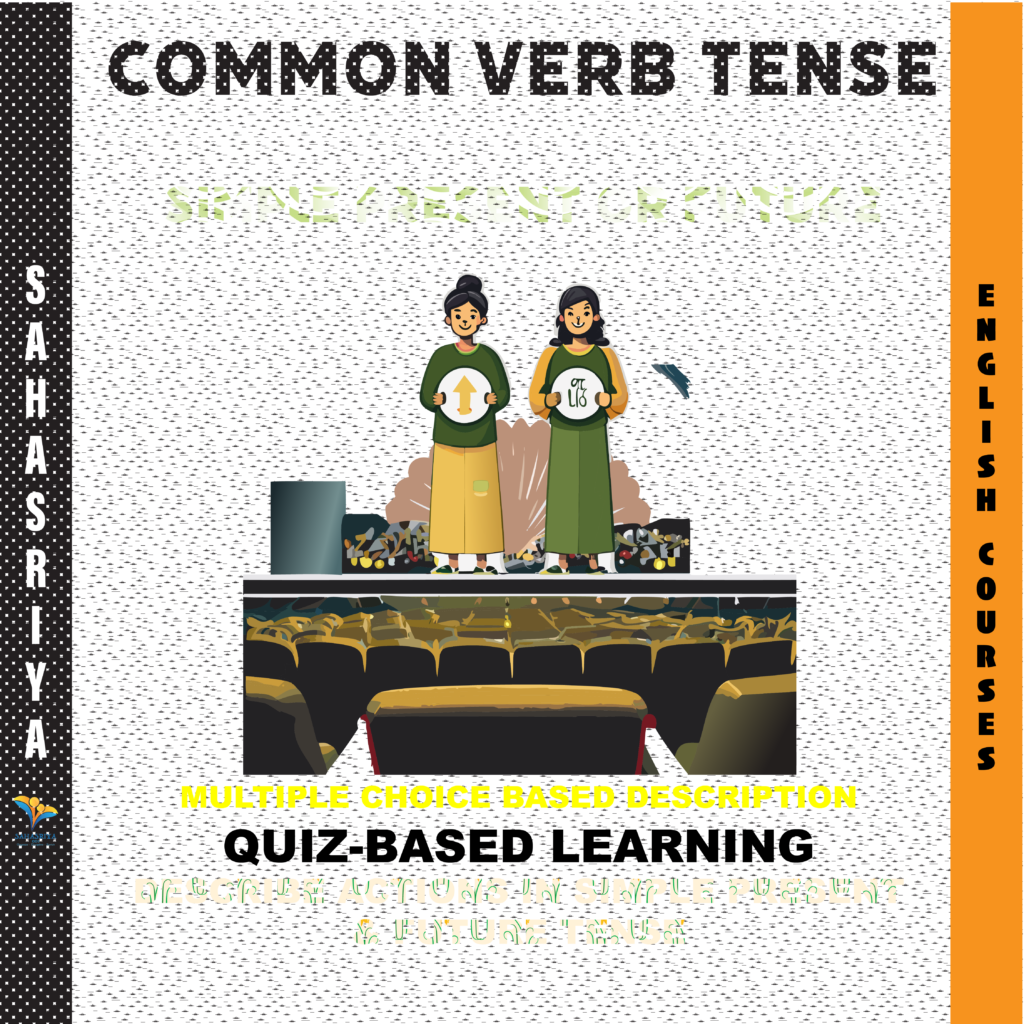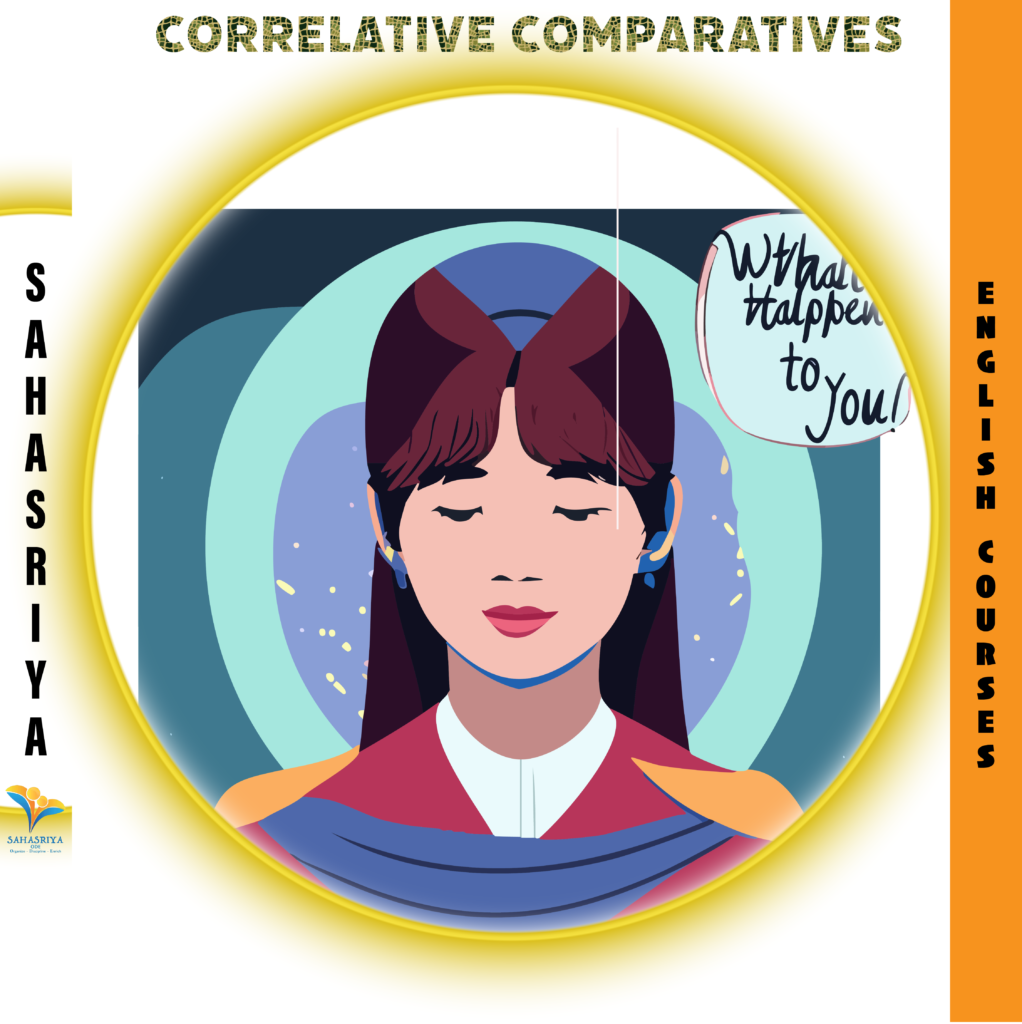How about quizzical learning for English? Present to the future
Hi, I’m Govind. Welcome back to another Learn English with Fun podcast by Sahasriya where we talk about English grammar, vocabulary and pronunciation twice every week. You get to practice your listening skills and learn valuable tips to become more fluent in English.
Today we’re talking about grammar. We’re going to focus on the meanings of the most common verb tense in English – the simple present. This verb tense is used all the time. It is very frequent, and very important. But did you know, very often, simple present tense is used to talk about action in the future as well. Surprised? Lets check this podcast then
Okay, so back to the present simple verb tense. First, let me give you some examples of this verb so you know what I’m talking about. Actually… let me give you a quiz. I’m going to say three sentences. I want you to listen carefully for the sentence that contains the present simple verb tense: choose A, B or C. Ready?
- I went to special class on Thursday.
- I go to special class on Thursday.
- I am going to special class on Thursday.
Again, listen carefully for the present simple verb tense:
- I went to special class on Thursday.
- I go to special class on Thursday.
- I am going to special class on Thursday.
Did you get it? The answer is 2: I go to special class on Thursday.
Could you hear how the verb changes the meaning of the three sentences? The use of the present simple here gives the meaning of: REPETITION, or a REPEATED action. The repeated action here is going to special class: I go to special class on Thursday.
So we use this verb tense – the present simple – to show repetition. This time I’ll give you another quiz, and instead of listening for the present simple verb, I want you to listen for the sentence that shows ‘repetition’ or a ‘habit’ – so you’ll be listening for the meaning of the sentence. Ready? Which of these sentences, A, B or C shows repetition or repeated action or a habit:
- He goes to gym in the afternoon.
- He went to gym in the afternoon.
- He will go to gym in the afternoon.
One more time: listen for the sentence that shows a repetition of something:
- He goes to gym in the afternoon.
- He went to gym in the afternoon.
- He will go to gym in the afternoon.
The answer here is 1: He goes to gym in the afternoon. The verb – goes – in this form gives the meaning of a repetition or something he does habitually. This is something that he does every afternoon.
Okay… That may have been simple but where is the future aspect of simple present? Let’s look at the second use of the verb – or the second meaning of the verb now.
This time, we’re going to learn how to use this verb to show a future event. WHAT?! A future event. That’s weird, because this is the “present” simple. Hmmm, well, I hate to tell you this but native English speakers use this verb to talk about the future all the time.
Listen carefully to this example sentence that uses the present simple to talk about the future:
The flight departs tonight at 8pm.
Again, listen for how this sentence shows the future:
The flight departs tonight at 8pm.
Notice how I did NOT use a future verb tense. I mean, I could have said:
The flight WILL depart tonight at 8pm. That’s fine – I could use the future simple to show the future, or I could say:
The flight is going to depart tonight at 8pm – this verb – going to depart – also shows the future, but I can also say:
The flight departs tonight at 8pm. This is a very common use of the present simple to refer to the future.
So let’s do a quiz now. I’m going to say three sentences. Each sentence refers to the future. But only one of them uses the present simple. Choose A, B or C for the present simple that refers to the future. Ready?
- A The train will start at midnight.
- The train is going to start at midnight.
- The train starts at midnight.
Did you get it? The answer is 3: The train starts at midnight. This sentence uses the present simple to talk about the future – or an event that is going to happen.
Let’s do one more so you can really understand this. Ready? Listen for the sentence that uses the present simple to refer to the future:
- The exhibition begins tomorrow.
- The exhibition will begin tomorrow.
- The exhibition is going to begin tomorrow.
Did you hear it? The answer is 1.
Hopefully now you have a clearer understanding of how native English speakers talk about the future using the present simple. I told you this verb tense has a silly name, right? It’s not present and it’s not simple.
Let’s look at one more meaning and use of the present simple so you can become an expert. This time, we’ll look at how you can use the present simple to talk about FACTS.
Here are a few facts using the present simple:
The earth orbits the sun. This is a fact, and the verb orbits, is in the present simple here. We use the present simple to show a fact. We can’t say:
The earth orbited the sun – this would mean that it no longer happens. Or we can’t say:
The earth will orbit the sun – this means that it currently does not… Or we can’t say:
The earth has orbited the sun – this means that it once did but does not anymore.
Here’s another fact: Govind likes teaching English. The verb here is ‘likes’; it’s in the present simple and we use it because it’s a fact. Govind likes teaching English.
Let’s do another quiz. This time I’m going to say three sentences, A, B and C, and you need to listen for the fact. Ready?
- A Water is boiling at 100 degrees.
- Water has boiled at 100 degrees.
- Water boils at 100 degrees.
Did you get it? The answer is 3. The fact is: Water boils at 100 degrees. Let’s do another one. Ready?
- The sun set in the west.
- The sun will set in the west.
- The sun sets in the west.
Ah, how did you go with this one? It’s a bit tricky because the verb ‘set’ doesn’t change much, but the answer is 3. The fact is: The sun sets in the west.
One more, ready?
- Elephants live for 100 years on average.
- Elephants live in Africa.
- Elephants live in small groups.
Aha! Got ya. These are all facts. And I’ve used the present simple verb ‘live’ to show the fact.
Okay, hopefully now you have a clearer understanding of how to use the Present Simple verb tense. We learned that you can use the present simple to show repetition or habits, you can also use it to refer to the future, and, finally, you can use it to talk about facts.
Remember that if you need help with your English you should do two things: One: Subscribe to Learn English with Fun podcast at Spotify. Two: Check out www.sahasriya.com. We have lots of great online English courses including IELTS, PTE courses.
My name is Govind, and I’ll see you soon!



